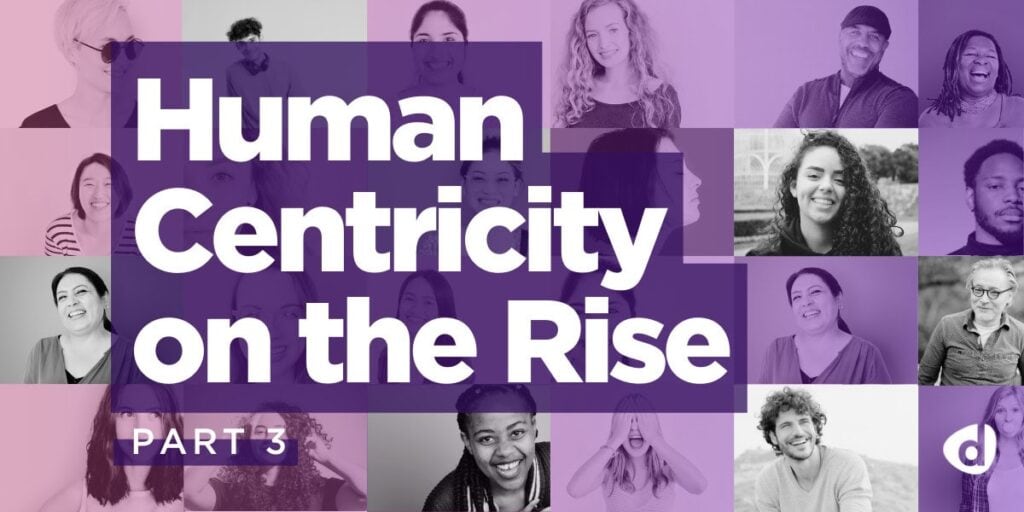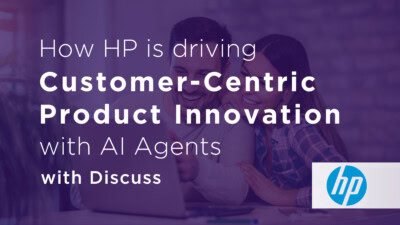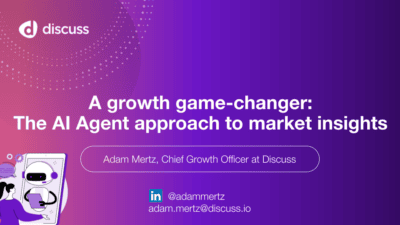Redefining Empathy: 5 Strategies to Drive Human Centricity with Qualitative Research

Overcoming Traditional Qualitative Research Challenges with Next Gen Solutions
Human centricity is crucial for businesses, prioritizing consumer needs, preferences, and experiences. Without empathy and context, data lacks meaning. The rise of this new human-centric or consumer-centric approach, allows businesses to prioritize understanding consumers as people first, customers second.
Traditional empathy work in market research has long been associated with challenges such as sluggishness, high costs, execution difficulties, and interpretation complexities. This blog will share approaches aimed at overcoming these obstacles to revolutionize human centricity in qualitative research.
Traditional Challenges in Human Centricity and Consumer Empathy
Traditional methods of driving consumer empathy and human centricity have long had several challenges that hinder their effectiveness including:
- Unstructured Data Interpretation, Slow Analysis and Limited Scalability: Traditional means of analyzing of unstructured data, along with time-intensive methods like in-person focus groups or interviews, can be both time-consuming and prone to subjective interpretations, hindering swift responses to market changes or consumer needs, and limiting scalability due to resource and coordination demands.
- High Cost of Implementation: Traditional empathy initiatives can be costly due to expenses such as venue rentals, moderator fees, transcription services, software licenses, and team training, posing challenges for smaller businesses or startups.
- Complexity and Difficulty in Execution: Coordinating logistics and ensuring consistency across research sites makes conducting traditional empathy programs across geographical locations challenging.
- Inadequate Integration of Technology: Resistance to adopting technological advancements hampers efficiency, scalability, and insight depth in market research practices.
These challenges can all be distilled into three key points: the traditional method of practicing empathy is excessively time-consuming and expensive, susceptible to errors and delays, and constrains the depth and scope of insights obtained.
Practical Strategies for Putting People First with Human-Centric Empathy Initiatives
In response to the inherent challenges of traditional methods, there’s a growing recognition of the need to redefine the approach to human centricity and empathy programs. This shift emphasizes the importance of agility, cost-effectiveness, streamlined execution, and GenAI to unlock new possibilities for harnessing the power of consumer empathy. Here’s how businesses can embark into this new era:
1. Strategic Mindset Over Functionality:
Human centricity cannot be just a function within the organization; it’s a strategic mindset that permeates every level, from senior leadership down to frontline employees. It begins with a mandate from senior leadership, demonstrating a commitment to understanding and empathizing with consumers. A structured methodology is essential, providing a framework for conducting empathy work consistently and effectively.
Shared engagement across the company ensures that empathy becomes a collective responsibility, with everyone contributing to building a deeper understanding of consumer needs and preferences. Establishing KPIs and metrics that roll up to your human-centric initiatives enables organizations to measure the effectiveness of their empathy programs.
2. Leveraging an All-in-One Partner:
Partnering with a strategic vendor that offers an all-in-one platform for empathy initiatives can be transformative in redefining the approach to human centricity. This centralized approach fosters collaboration and knowledge sharing while ensuring consistency and reliability in research processes by housing everything in one location – from interviews to insights.
Instead of having multiple different tools and platforms for different aspects of research, having everything in one place saves time and effort to streamline empathy initiatives. Tracking and comparing findings in a centralized repository allows for a more comprehensive understanding of consumer insights. Additionally, using an all-in-one platform can enhance collaboration among team members, as everyone can access and contribute to the research from a single platform.
3. Driving Human Centricity on a Global Scale
Human centricity is the interweaving of consumer voices into business decisions within the organization. Businesses are recognizing the importance of understanding consumer behavior on a global scale, incorporating insights from diverse regions and perspectives in their strategies.
GenAI is the unlock for scaling this previously unstructured data with newfound efficiency and depth. GenAI summaries and thematic analysis of consumer conversations streamline the research process, while also enabling researchers to conduct studies worldwide in various languages, facilitating human centricity that transcends boundaries.
For global research, the optimal platform should empower researchers to conduct studies globally across different languages, enhancing understanding of central themes even across interviews in diverse languages. The GenAI should be designed to incorporate and synthesize not only English interviews but also those conducted in other languages. Moreover, it should possess the ability to translate these multilingual interviews into English summaries, enabling comparisons of research outcomes across various regions and offering a more expansive global outlook on consumer insights.
4. Elevate Your Qual Research by Tapping into GenAI-Powered Insights
GenAI fundamentally transforms the landscape of insight generation and analysis, offering researchers unprecedented capabilities to enrich their human-centric initiatives. Through its seamless summarization, analysis, and identification of key themes within qualitative data, GenAI not only enhances empathy and understanding within the organization but also places the human element at the forefront of decision-making processes.
By automating labor-intensive tasks, GenAI liberates teams from mundane data processing, allowing them to dedicate more time and energy to truly understanding and empathizing with consumers. This shift towards a more human-centric approach permeates all aspects of the business, fostering deeper connections and loyalty among consumers.
GenAI’s capacity to objectively analyze data without preconceived notions, minimizes the impact of confirmation bias. Its consistent approach to data analysis ensures that each piece of information is evaluated using the same criteria, further reducing the likelihood of subjective interpretations which might skew the insights.
5. Unlocking Unlimited Access: Empowering Human-Centric Research
Historically, traditional research models have posed significant barriers to additional inquiry due to restricted access to essential services and support. These limitations often deter researchers from exploring further, as each additional session or step incurs additional costs and logistical complexities. However, the emergence of unlimited access platforms marks a paradigm shift in the research landscape. These platforms offer researchers unparalleled freedom and flexibility to conduct research without constraints, empowering them to pursue their inquiries more expansively and creatively.
By removing these barriers, unlimited access platforms empower businesses to engage in more human-centric qualitative research practices. Researchers can delve deeper into understanding consumer needs, preferences, and experiences, fostering richer insights and connections. This shift towards a more expansive and inclusive research approach not only enhances the quality of research outcomes but also enables businesses to cultivate stronger relationships with their target audience. Ultimately, by embracing these platforms, organizations can elevate their human-centric initiatives and drive sustainable growth and success.
Fostering Human-Centric Insights with Discuss
Discuss offers a suite of innovative solutions designed to drive next gen insights and promote human centricity in empathy programs. By democratizing access to the consumer and facilitating seamless research processes, Discuss empowers organizations to gain a deeper understanding of their audience and develop more empathetic strategies.
Learn how Discuss can help you drive next gen insights and human centricity. Connect with us today.
Ready to unlock human-centric market insights?
Related Articles

Why Your Business Needs a Multicultural Marketing Strategy
A recent Ad Age article highlights a notable trend that some companies are taking a stand to keep DEI at…
A recent Ad Age article highlights a notable trend that some companies are taking a stand to keep DEI at…

Human Centricity on the Rise: Navigating the New Era, Part 3
How to unlock human centricity at scale with a key mindset shift In Part 1 of this blog series, I…
How to unlock human centricity at scale with a key mindset shift In Part 1 of this blog series, I…

3 Ways to Design for Empathy & Human Centricity
By Adam Mertz, Chief Growth Officer at Discuss Introduction I recently had the opportunity to moderate a compelling discussion between…
By Adam Mertz, Chief Growth Officer at Discuss Introduction I recently had the opportunity to moderate a compelling discussion between…



